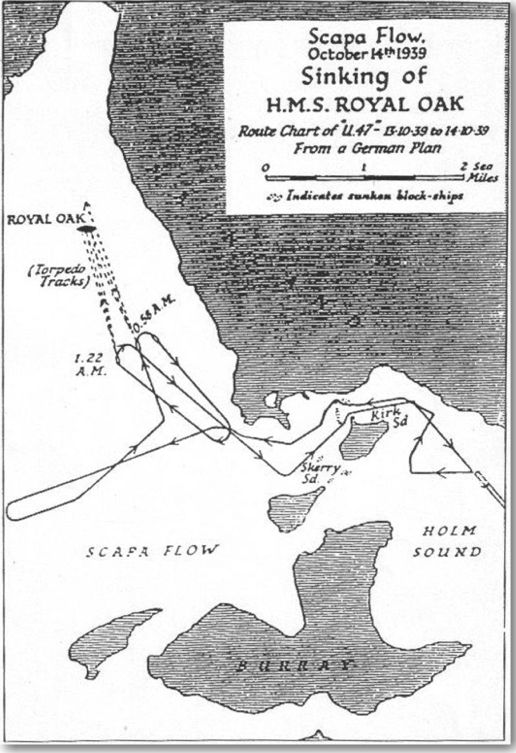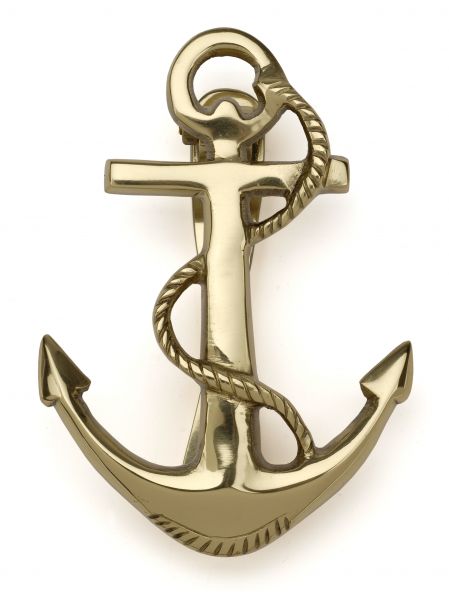


One of the many facts about the Kreigsmarine forgotten or overlooked with the passage of time is that the German Navy would not accept members of the SS or the Nazi party into its ranks. If one had past associations with either, they needed to be formally renounced prior to being accepted into the German Senior Service. So it was with Guther Prien, Captain of the U-47, and leader of one of the most daring raids in the history of submarine warfare.

After joining the Navy, Gunther Prien progressed steadily in rank, from Fähnrich zur See (midshipman) in 1933, to Oberfähnrich zur See (senior midshipman) in 1935, Leutnant zur See (sub-lieutenant) also in 1935, then Oberleutnant zur See (lieutenant) in 1937. He was appointed to the command of the new Type VIIB U-47 on her commissioning (17 December 1938) and promoted to Kapitänleutnant (lieutenant) on 1 February 1939.



On 14 October 1939 Prien risked shallow water, unknown shoals, tricky currents and detection by defenders to penetrate the Royal Navy's primary base, Scapa Flow. Although most of the Home Fleet was at sea, Prien sank the battleship Royal Oak and returned home to instant fame. He was awarded the Knight's Cross of the Iron Cross, the first member of the Kriegsmarine to receive this award.

The mission into Scapa Flow called for volunteers only; Prien had no hesitation in accepting the mission. In a token to the voluntary nature of the mission, Prien spoke to his crew whilst U-47 was lying off Scapa Flow, and having briefed them, he announced that anyone not wishing to volunteer could leave the boat immediately. Unsurprisingly no one accepted the offer to disembark in the middle of the North Sea. Prien received the nickname Der Stier von Scapa Flow ("The Bull of Scapa Flow"); the emblem of a snorting bull was painted on the conning tower of U-47 and soon became the emblem of the entire Unterseebootsflottille.
.jpg)


The British were initially confused as to the cause of the sinking, suspecting either an on-board explosion or aerial attack. Once it was realised that a submarine attack was the most likely explanation, steps were rapidly made to seal the anchorage, but U-47 had already escaped and was on its way back to Germany. The BBC released news of the sinking by late morning on 14 October, and its broadcasts were received by the German listening services and by U-47 itself. Divers sent down on the morning after the explosion discovered remnants of a German torpedo, confirming the means of attack. On the 17 October First Lord of the Admiralty Winston Churchill officially announced the loss of Royal Oak to the House of Commons, first conceding that the raid had been "a remarkable exploit of professional skill and daring", but then declaring that the loss would not materially affect the naval balance of power. An Admiralty Board of Inquiry convened between 18 and 24 October to establish the circumstances under which the anchorage had been penetrated. In the meantime, the Home Fleet was ordered to remain at safer ports until security issues at Scapa could be addressed.
The Nazi Propaganda Ministry was quick to capitalise on the successful raid, and radio broadcasts by the popular journalist Hans Fritzsche displayed the triumph felt throughout Germany. Prien and his crew reached Wilhelmshaven at 11:44 on 17 October and were immediately greeted as heroes, learning that Prien had been awarded the Iron Cross First Class, and each man of the crew the Iron Cross Second Class. Hitler sent his personal plane to bring the crew to Berlin, where he further invested Prien with the Knight's Cross of the Iron Cross. This decoration, made for the first time to a German naval officer, later became the customary decoration for successful U-Boat commanders. Dönitz was rewarded by promotion from Commodore to Rear-Admiral and was made Flag Officer of U-Boats.
The British Admiralty's official report into the disaster condemned the defences at Scapa Flow, and censured Sir Wilfred French, Admiral Commanding Orkney and Shetland, for their unprepared state. Admiral French was placed on the retired list, despite having warned the previous summer of Scapa Flow's deficient anti-submarine defences, and volunteering to bring a small ship or submarine himself past the blockships to prove his point.

On Churchill's orders, the eastern approaches to Scapa Flow were sealed with concrete causeways linking Lamb Holm, Glimp Holm, Burray and South Ronaldsay to the Orkney Mainland. Constructed largely by Italian prisoners of war, the Churchill Barriers, as they became known, were essentially complete by September 1944, though they were not opened officially until just after VE Day in May 1945. They now form part of the transport infrastructure of the Orkneys, carrying the A961 road between the islands.

No comments:
Post a Comment